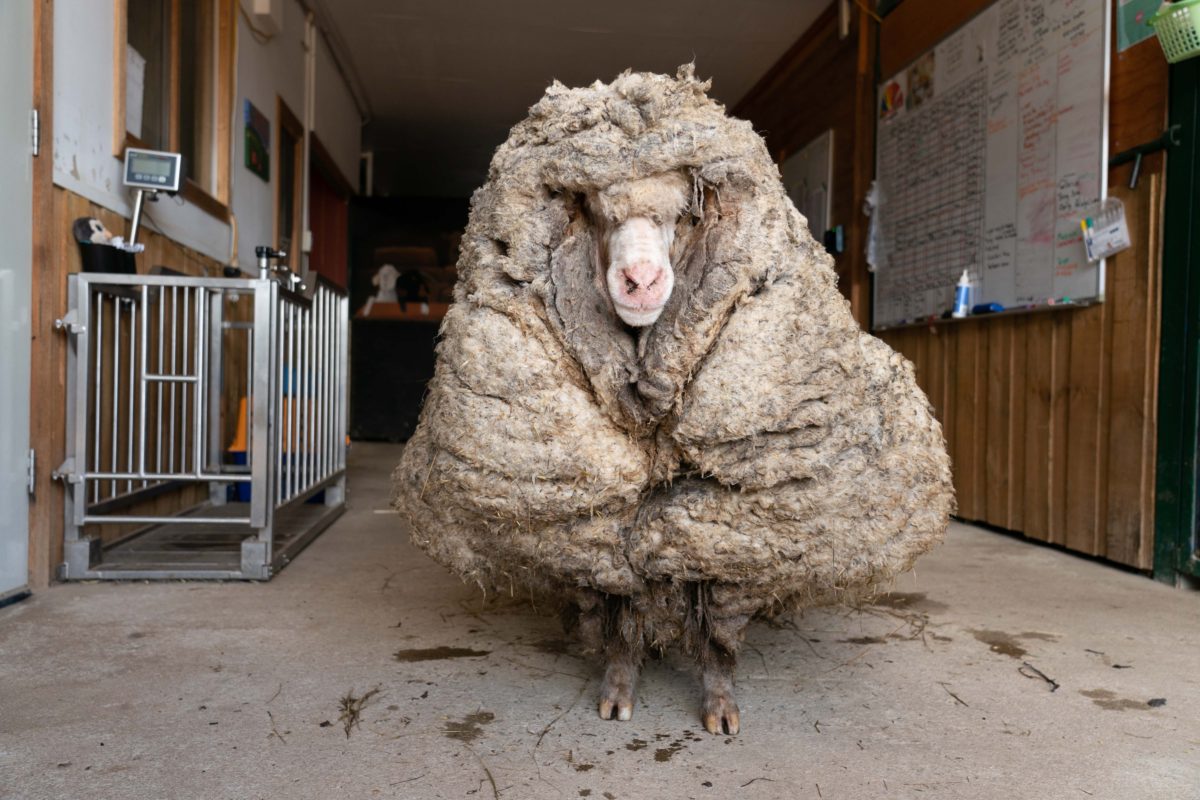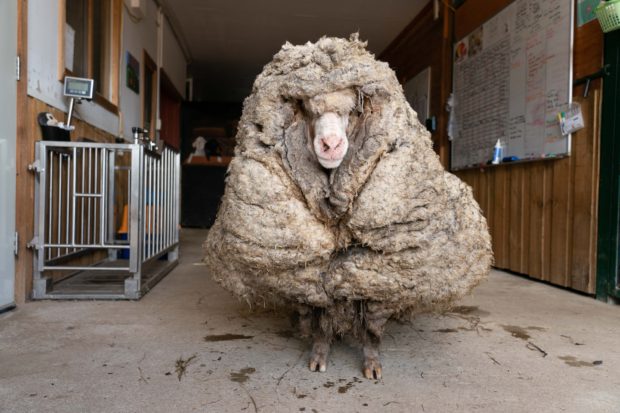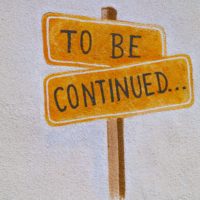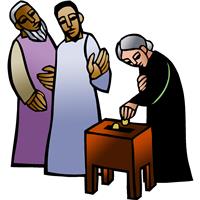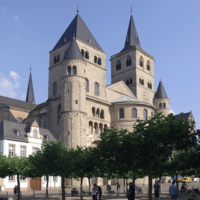Alleluia, Christ is risen! He is risen indeed, alleluia!
This past February, a curious story from Down Under made the news: a sheep was found in a forest in Australia that hadn’t been shorn in years.
Wild sheep don’t grow such enormous fleeces of wool – and, like many other animals, wild sheep shed their coat naturally, depending on the seasons. However, from the time sheep were domesticated sometime between 10,000 and 8,000 B.C., they were bred to provide wool for human consumption. Domesticated sheep today are shorn about once a year. And it’s not only humans who benefit from the shearing – the sheep benefit greatly as well. One just has to take a look at this poor sheep to see why.
This sheep, which was named Baarack by his rescuers, most likely was abandoned at some point and left to fend on his own. Which Baarack did remarkably well. He survived several years in the wild. But it was good he was found. He could barely see anymore because of all the wool. When he was shorn, it turned out that the fleece weighed a whopping 77 pounds – for comparison, a normal fleece weighs 5-10 pounds.
This heavy fleece kept Baarack from moving about freely and finding food. He was found to be quite underweight once the fleece was off. Here is a picture of Baarack once all the wool was sheared off (he’s the one in the center). Talk about a ‘before and after’!
But Baarack did not only suffer from malnutrition, but also from an eye infection, and ulcer, and several other ailments due to his overgrown fleece. He probably would have died soon if he hadn’t been found and rescued. Baarack adjusted well to his new surroundings at Edgar’s Mission, a rescue farm for animals of all kind, and enjoys his new life as part of a flock and under the loving care of humans. And at this point, I want to thank Edgar’s Mission for not only providing me with pictures and videos of Baarack’s rescue, but also with his very detailed story and an update about his condition today. Considering that he was feral for so long, it is amazing how quickly he came to trust the people who took care of him. And I can only say: may he live long and prosper!
In the Bible we find lots of sheep. Sheep have always been an important part of life in the Middle East. So important, in fact, that the relationship between sheep and shepherd became a favorite image for the relationship between God and God’s people. We find the most tender expression of this relationship in the psalm we prayed today: ‘The Lord is my shepherd. I shall not want…’ – ‘Der Herr ist mein Hirte – mir wird nichts mangeln…’
There is this utmost trust that God will take care of us, through thick and thin, over mountaintops and through dark valleys.
Jesus repeatedly uses this image. His parable of the lost sheep is one of the best known stories he told his followers. And looking at Baarack, we see what happens when sheep get lost. Without the protection of the community of the flock, without proper guidance and care, we might survive for a while. The question is: how long and how well?
In today’s gospel, Jesus tells his followers that he himself is the good shepherd for God’s people; a shepherd unlike others shepherds, who, as hired hands, just take flight when the wolf comes – who don’t really give a hoot if something happens to any member of the flock, especially the vulnerable ones. No, Jesus is a shepherd who truly cares, a shepherd who is so dedicated to his flock that he even lays down his life for them – and that includes everyone: the young, the old, the strong, the weak, the healthy, the injured, the assertive, the timid, even the stubborn ones. There is no Darwinism of the biological or social kind involved in Christ’s care for the members of his flock. With Christ, the good shepherd, it’s not about survival of the fittest, but life eternal to the fullest for the beloved.
Now being considered a sheep is not a particularly popular thing in our day and age and society. In fact, it is quite counter-cultural.
I you just google ‘being a sheep’, or ‘being like a sheep’, you will find quotes like, ‘I’d rather be a wolf for a day than be a sheep my whole life’. You will also find books by self-help gurus who admonish us to ‘quit being a sheep’ and take responsibility for our lives, going our own ways. Now there is something to ponder.
And I cannot tell you how many times during the pandemic I came across comments from those denying or belittling COVID-19 and its effects – anti-maskers, anti-vaxxers – in which the term ‘sheep’ was used. And not in a kind way, rather in the way of, ‘Look at all those dumb sheep who let themselves be led by the Corona hoax- or an overreaching government – or fear – or Bill Gates in his effort to gain world domination through vaccination.’
Often, individual freedom and radical independence are being touted as the utmost principles that need to be achieved and defended at all cost. I go off and do my own thing! Who needs the flock? Why should I worry about the weak and vulnerable ones? Let them fend for themselves, hide out, isolate, if they have to. I want my personal freedom, and I am taking it. Good for them. Not so good for others.
Since the pandemic started, there have been quite a few people who have felt like poor Baarack, the sheep, out in the wilderness: abandoned. Being forced to fend more or less on their own for much longer than necessary, as the strong ones stretch or flaunt the rules that are meant to protect the larger community. Once we are in a place we go back to ‘normal’ – whatever that may be – there will be a lot of heavy emotional fleeces that need to be shed, exposing starved souls.
And what are we mostly starving for? I think we can agree that it is community: being together with others face to face, making eye contact, laughing together, eating together, singing together, just carelessly strolling through a crowd, giving and receiving hugs. The pandemic has shown us that we are truly social animals. We are part of a flock. We are codependent. Just imagine what we would have done this past year without healthcare professionals, and those who still showed up physically to do their work, like planting and harvesting, or driving a delivery truck, or stocking our supermarket shelves and serving us as checkers.
Some folks may pride themselves in being so independent and tout their individual freedom – but the reality is that the vast majority of human beings is not self-sufficient, but depends on others. We are in this together. Our freedom has to come with responsibility for others, for the well-being of the entire flock – otherwise we end up in a dystopian world where freedom effectively is only the freedom of the stronger, the richer, the more powerful ones, and any shred of freedom of the weaker ones is trampled underfoot.
The father of our church, Martin Luther, wrote about Christian freedom in the 16th century in his treatise ‘The Freedom of a Christian’: “A Christian is a perfectly free lord of all, subject to none. A Christian is a perfectly dutiful servant of all, subject to all.” In other words: Christian freedom mandates responsibility for the neighbor.
As Jesus talks about himself as this good shepherd who will not abandon his flock, no matter, what, we are reminded that we are part of his flock, and not just a single sheep that receives special and a highly individualistic treatment from the shepherd. We are also reminded that we are called to follow this good shepherd, and to follow his example. To look out for others in the flock. To not abandon anyone. To pay special attention to the weak and vulnerable. To think about the needs of others and not just about ourselves. To make sacrifices for the sake of the greater good. To bring those home and take care of those who are lost.
If we follow Christ, the good shepherd, in this way, ‘surely, goodness and mercy shall follow us all the days of our lives. And we shall dwell in the house of the Lord forevermore.’
Amen
This post is also available in: German

